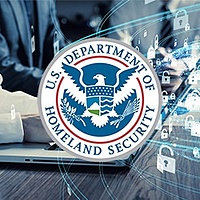June 14, 2019
by Gary M. Barraco, Product Evangelist with Amber Road
Technological advancements have been constantly evolving, changing the way we communicate, work, educate, date, shop and much more. However, all of the advantages also bring detriments, especially bringing higher risk levels to supply chains that rely on electronic communications that whirl around the globe at the speed of light across servers, networks, mobile and desktop devices. The state of global trade has carried more risk than we see in our technology-laden environment.
Over the past three years, supply chain technology attacks have crippled retailers, distributors and manufacturers alike. Studies have found that most of the risk to supply chain security comes from suppliers and other third-party trading partners. Some US government are stepping up their regulatory guidelines to help companies create and monitor supply chain security.
 After 9/11, the United States Customs-Trade Partnership against Terrorism (C-TPAT) program was created to safeguard the world’s trade industry from the threat of terrorist attack, while also preserving the economic health of the United States and its neighbors. So, there is a natural fit for additional security measures to be part of this existing program. The voluntary program provides guidelines for shippers and suppliers to become certified through audits that test their specific security measures and best practices.
After 9/11, the United States Customs-Trade Partnership against Terrorism (C-TPAT) program was created to safeguard the world’s trade industry from the threat of terrorist attack, while also preserving the economic health of the United States and its neighbors. So, there is a natural fit for additional security measures to be part of this existing program. The voluntary program provides guidelines for shippers and suppliers to become certified through audits that test their specific security measures and best practices.
In 2016, began updating the programs Minimum Security Criteria (MSC). In conjunction with other government agencies, trade associations, and shippers, CBP released new program updates that will better reflect the current supply chain environment and threats the global supply chain faces today.
As the agency finalized the program revisions last month, three new areas of minimum security were distinctly prominent.
Being part of the C-TPAT certified group comes with its own set of benefits including access to Free and Secure Trade (FAST) lanes at the borders, exemptions from certain exams, and eligibility to advance to higher levels of certification like the Importer Self-Assessment and Trusted Trader programs.
Ascena Global Sourcing (AGS) is a division of Ascena Retail Group and serves as the single direct sourcing organization supporting all Ascena brands. Ascena Retail Group is a leading apparel retailer with brands that include Ann Taylor, Lane Bryant, Dress Barn and The Loft. AGS recently decided to become a C-TPAT participant. A company representative stated, “In reviewing our global supply chain network, Ascena determined that C-TPAT participation will result in speed and cost efficiencies through improved cargo security, reduced lead time at the border and lower cost of customs exams.”
The new minimum security requirements also align C-TPAT with similarly beneficial programs in other countries, including the EU AEO and J-AEO. The ultimate goal would be for the establishment of a worldwide standard. “We found that C-TPAT procedures boost our ability to manage global trade compliance requirements and improve cross-border operations proactively,” said the trade compliance manager with Ascena Retail.
Fortunately, companies don’t need to manage the complexities of obtaining C-TPAT certification on their own. The right automation technology and solutions can help maximize the visibility and management over supplier operations, in-transit movements, and export/import operations required to meet the program standards. When seeking entrance into the program, many companies also engage with experienced advisors to effectively guide them through the application and qualification process. By relying on experienced professionals and current technology, the validation process is accelerated, and benefits are quickly realized.
 About the Author
About the Author
Gary M. Barraco, Product Evangelist
Gary is responsible for developing strategic product marketing direction and presenting the Amber Road brand and solutions worldwide. As the platform evangelist, Gary develops and launches customer insights, go-to-market plans, product messaging and content, and field marketing tactics which establish Amber Road’s solutions as a standard in the supply chain execution space.
Scott Ellyson, CEO of East West Manufacturing, brings decades of global manufacturing and supply chain leadership to the conversation. In this episode, he shares practical insights on scaling operations, navigating complexity, and building resilient manufacturing networks in an increasingly connected world.